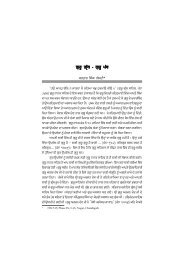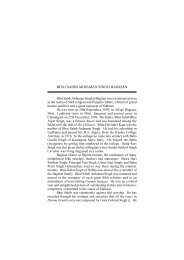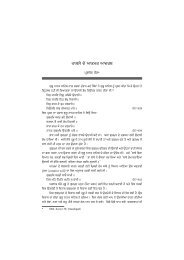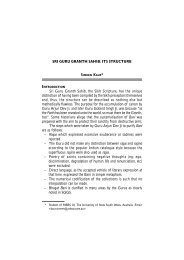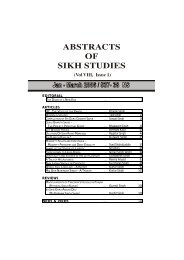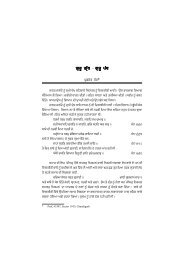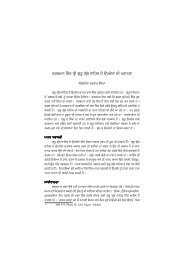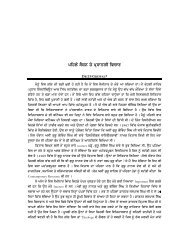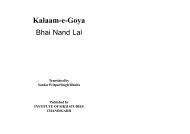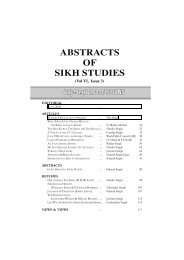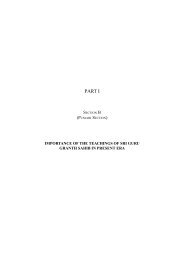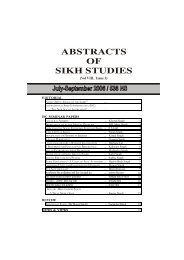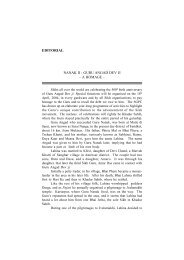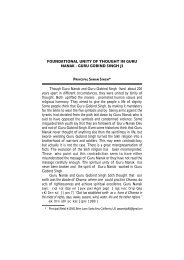editorial articles reviews news & views - Institute of Sikh Studies
editorial articles reviews news & views - Institute of Sikh Studies
editorial articles reviews news & views - Institute of Sikh Studies
Create successful ePaper yourself
Turn your PDF publications into a flip-book with our unique Google optimized e-Paper software.
32<br />
ABSTRACTS OF SIKH STUDIES : APRIL-JUNE 2005 / 537 NS<br />
thought and spirituality. There are many well-meaning scholars who<br />
are eager to write on this subject and to translate the Sacred Texts.<br />
Not all <strong>of</strong> them, however, may qualify to do so. Each one has the<br />
indelible imprint <strong>of</strong> his own level <strong>of</strong> understanding and spiritual<br />
experience, and it is but natural that they view the sacred gurbani by<br />
the yardstick <strong>of</strong> their own competence. As Guru Gobind Singh says:<br />
Aap aapni budhi hei jeti,<br />
Barnat bhin bhin tohe teti. – Benati Chopai, p 10<br />
Each one to his own level <strong>of</strong> wisdom<br />
Expresses differently about You, the Lord.<br />
There are two types <strong>of</strong> people. Persons who are centred into<br />
their own shell and see matters in myopic sense according to their<br />
own experience and knowledge, are categorised as ‘Self-willed’. There<br />
are others, few in numbers, <strong>of</strong> course, who have the gift <strong>of</strong> experiencing<br />
the feelings and the <strong>views</strong> <strong>of</strong> others, called ‘Empathic’. The two are<br />
opposite to each other in nature. Although the Empathic are fewer<br />
compared to the Self-willed, it is desirable to entrust the job <strong>of</strong><br />
translation to the former in preference to the egotists.<br />
The translator <strong>of</strong> any writing has to develop two basic skills before<br />
taking up the very responsible task <strong>of</strong> presenting the thoughts <strong>of</strong> the<br />
original text to the unwary public who has no other means <strong>of</strong> access<br />
to the author. More so, when the writings are sacrosanct and may<br />
affect multitudes <strong>of</strong> people, who are dependant on the correct<br />
interpretation <strong>of</strong> the text. Translations should not lead haywire and<br />
allow incorrect perceptions. These two skills are, firstly, the in-depth<br />
personal understanding <strong>of</strong> the subject <strong>of</strong> metaphysics and flight <strong>of</strong><br />
imagination in divinity, and, secondly, the maturity <strong>of</strong> expression in<br />
apt phrases <strong>of</strong> what one wishes to convey. It will, indeed, involve<br />
wide and excellent vocabulary in a translator. In the case <strong>of</strong> any sacred<br />
text, the author, while writing the piece, requires not only poetic<br />
maturity in view but also its effect on innocent souls who eagerly take<br />
to the preaching contained therein. The translator has the onus <strong>of</strong><br />
passing on the essence and the ethos <strong>of</strong> the original to the reader,<br />
totally eclipsing his own personal feelings and preferences. It is not<br />
sufficient to rhyme the text, but to correlate the contents as conveyed<br />
in the translation with the original<br />
There have been errors <strong>of</strong> colossal proportions in the translations



